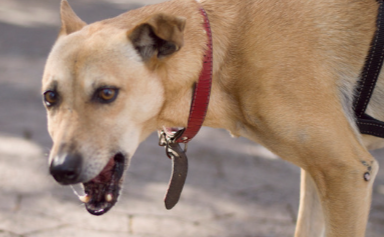“Dropped Jaw” AKA Trigeminal Neuritis
Trigeminal neuropathy is a disorder of the trigeminal nerve—the fifth cranial nerve—which controls the muscles used for chewing and provides sensation to the face. In pets with this condition, the jaw muscles become weak or paralyzed, making it difficult or impossible to close the mouth. This results in a “dropped jaw” appearance.
In most cases, the underlying cause remains unknown, and the condition is considered idiopathic—meaning it arises spontaneously or from an obscure or unknown cause. However, it's suspected that inflammation or an abnormal immune response may play a role. The condition may be triggered by a viral infection, mild trauma, or a previously unrecognized immune-mediated reaction targeting the nerve. In order to fully diagnose idiopathic trigeminal neuropathy, veterinarians must rule out other known causes of trigeminal nerve dysfunction, including tumors, infections, or inflammatory disease affecting the brain or cranial nerves., veterinarians must rule out other known causes of trigeminal nerve dysfunction, including tumors, infections, or inflammatory disease affecting the brain or cranial nerves.
Who’s Most Affected?
Trigeminal neuropathy can affect both dogs and cats. It appears to develop spontaneously and does not seem to be linked to breed, age, or sex. However, because it is rare, published data on risk factors are limited.
Signs
Signs usually appear suddenly and may affect both sides of the head. Common symptoms include:
Jaw hanging open (dropped jaw)
Inability to eat, chew, or drink normally
Muscle wasting in the temples or cheeks over time
Reduced facial sensation
No blink reflex when lightly touched near the eye (despite normal vision)
Occasional signs of Horner’s syndrome (eyelid droop, third eyelid elevation, eye sinking)
Affected pets are often bright and alert but unable to manage food and water on their own.
What You Can Do
If you notice sudden jaw weakness, difficulty eating, or facial muscle changes, contact your veterinarian promptly. While trigeminal neuropathy is not painful, it can lead to dehydration and weight loss if supportive care isn’t provided.
Diagnostic Tests
There is no single test to confirm idiopathic trigeminal neuropathy. Diagnosis relies on:
Physical and neurologic exams
Routine bloodwork
Skull or jaw radiographs
MRI or CT scan to rule out structural or inflammatory disease
Only after other potential causes are excluded can a diagnosis of idiopathic neuropathy be made.
Common Interventions
There is no direct cure, but pets often recover with supportive care:
Feeding support: Syringe feeding or a feeding tube may be needed to maintain nutrition.
Eye care: If the pet isn’t blinking regularly, lubricating ointments help protect the eyes.
Hydration monitoring: Some pets need fluids or appetite support while recovering.
Follow-up visits: Regular check-ins help track recovery and adjust care as needed.
Prognosis
The outlook is generally good. Most pets begin to recover within 2–4 weeks, though full nerve function may take several months to return. Some animals recover only partially, but many regain nearly normal jaw function over time.
If your pet suddenly can’t close their mouth, don’t panic—but do act. Fast intervention can keep them comfortable and supported while nature does the healing.
Gal Chivvis, DVM
Founder of Critter Care Collective, LLC
Emergency veterinarian, author, independent publisher

